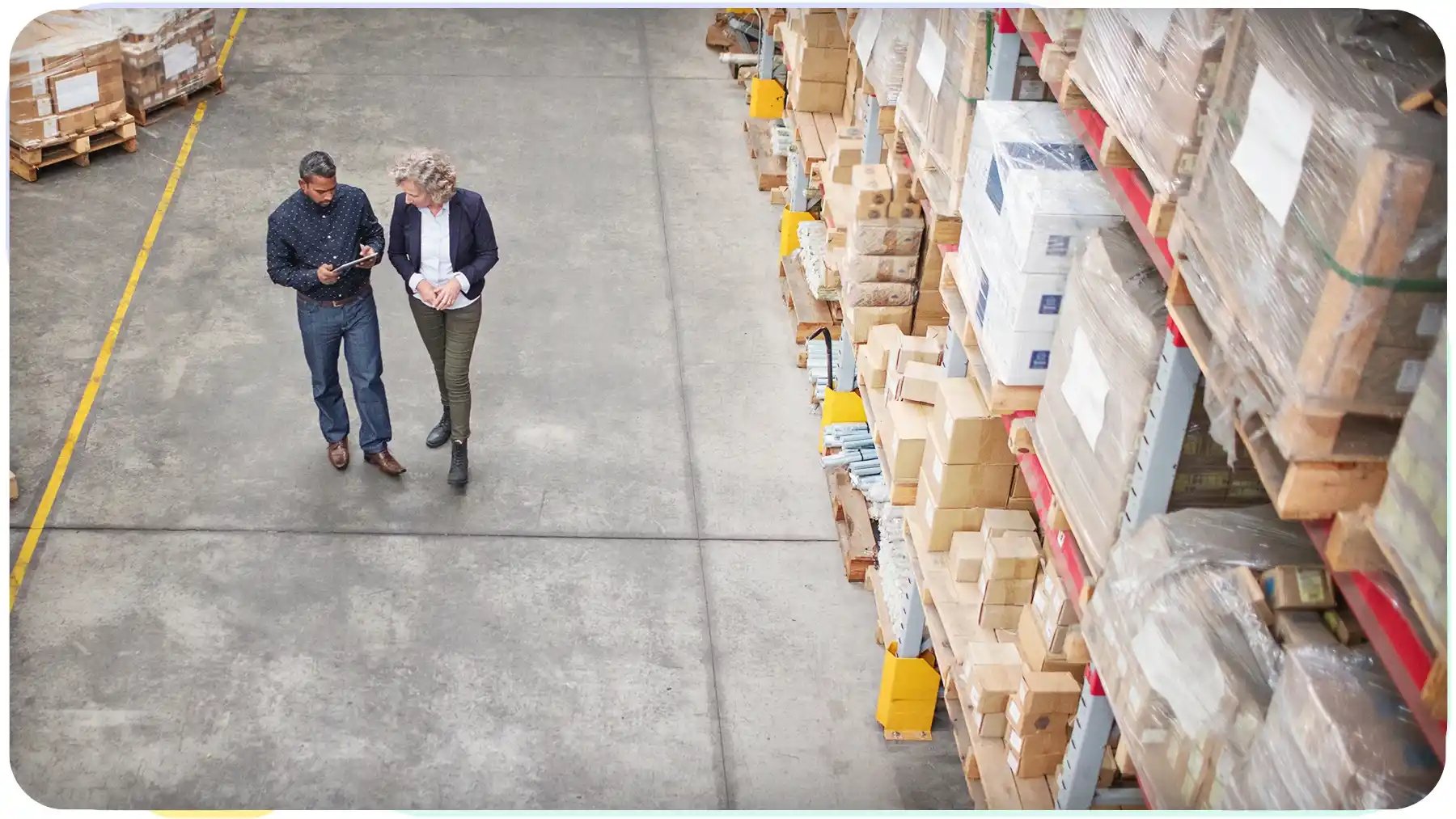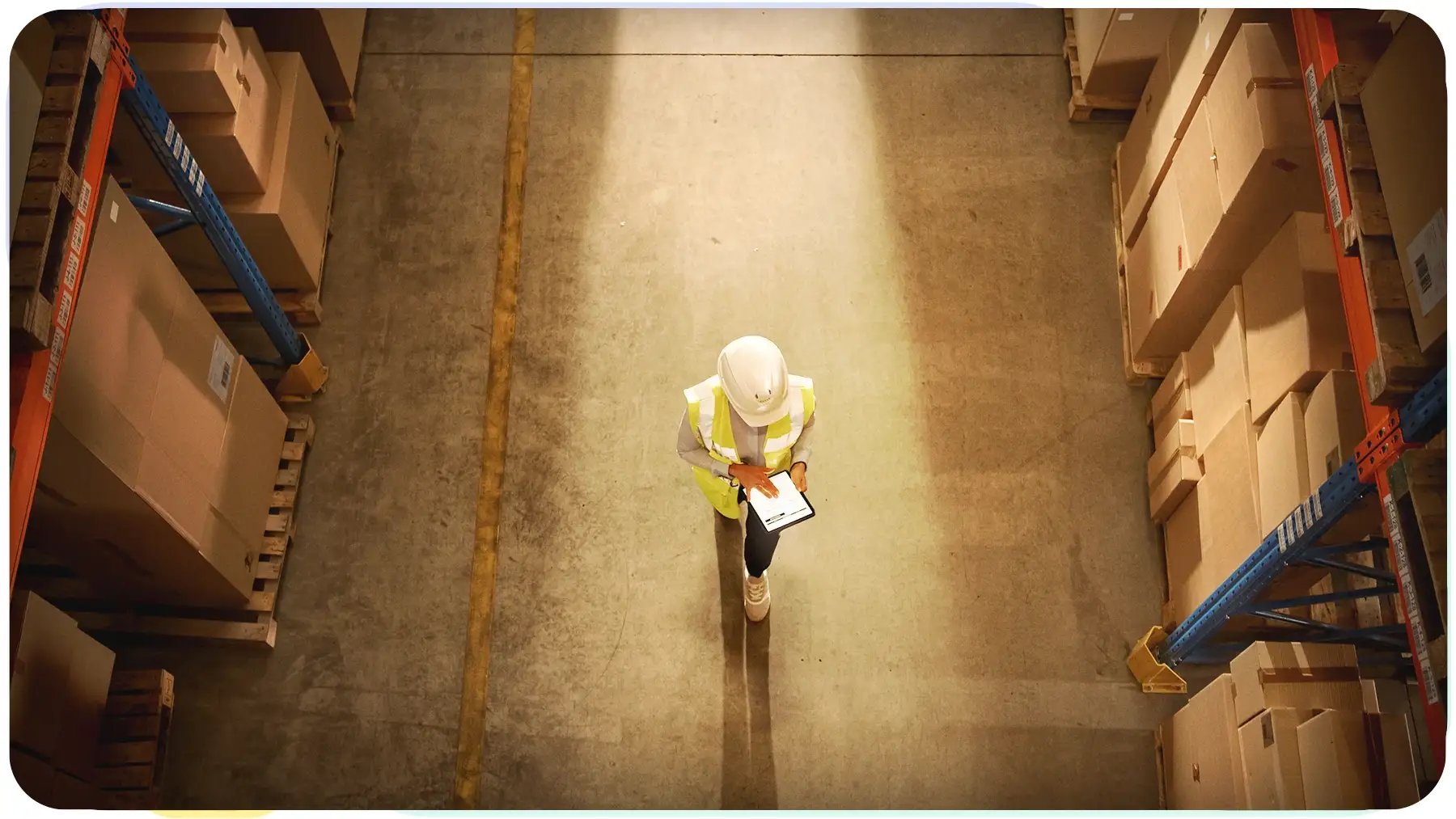- Products
- Use Cases
- Process contractors and validate credentials
- Improve facility compliance to industry standards
- Improve speed of visitor check-in process
- Screen visitors or restrict access to my facility
- Automate my reception experience
- Improve and automate my facility evacuation process
- Manage facility security across multiple locations
- Industries
- Pricing
- Resources
- Company
ERP Software 360: Complete Enterprise Resource Planning Guide
March 1, 2023
Companies need a reliable tool to keep their operations running smoothly, especially in complex, fluid environments. For example, say you have a fleet of trucks and dozens of warehouses. That can mean hundreds or thousands of people coming in and out of your facilities daily. You need to keep track of customers, vendors, inventory, and compliance. How do you ensure you manage and track all these processes efficiently?
Some of the largest companies in the world, like Amazon, solve this problem with enterprise resource planning (ERP) software. In this guide, we're doing a 360 overview of enterprise resource planning. What eERP is, some core features, and whether this is the right solution for your organization. As well, we provide available ERP alternatives that suit a range of business sizes, needs, and budgets.
Understanding Enterprise Resource Planning (ERP)
What is enterprise resource planning?
Large and complex, enterprise organizations require solutions that automate and integrate core facility processes. Powerful tools are required to help organizations track, coordinate, and streamline activities under one centralized platform. A possible solution is enterprise resource planning software.
ERP systems provide a unified enterprise system that replaces multiple software applications. They help streamline, automate, and integrate all aspects of business operations, including:
- Human resources
- Financials
- Inventory management
- Purchasing
- Customer Relationship Management (CRM)
- Supply Chain Management (SCM)
- Enterprise Performance Management (EPM)
Uniting these functions under a single automated tool helps businesses reduce costs, increase productivity, and improve customer service.

ERP systems also allow for scalability, which means businesses customize them to their specific needs. They offer company-wide visibility and provide real-time insights into various business areas, such as:
- Sales trends
- Customer preferences
- Financial performance
- Inventory levels
This helps businesses make informed decisions quickly and effectively.

Types of ERP Systems
Now that we understand the basics of resource planning tools, let's explore the types of ERP systems available in the market.
On-Premise ERP
On-premise ERP systems are installed on the company's computers and servers. This type of ERP system is ideal for large companies with the resources to manage their enterprise software on-site.
On-premise systems require a significant initial investment because of their expensive setup costs. In return, however, they offer greater control and flexibility. Companies customize the ERP system and make changes as needed to suit their specific enterprise needs. Additionally, they control the security of their enterprise data without relying on external servers.
For example, a company might need to customize its resource planning solution to track inventory levels, customer orders, and assembly line production. With an on-premise ERP system, the enterprise integrates the solution with existing software. This enables companies to manage the entire process in one unified platform.
Who is on-premise enterprise resource planning for?
- Enterprises planning to make a significant investment in this technology
- Desire for greater control and customization
Cons
- High installation cost
- Reduced digital security

Cloud ERP
At the opposite end of the spectrum, we have cloud-based ERPs. Instead of hosting the technology on-site, this is a web-based solution that runs on a cloud computing platform. The software is hosted offsite and is accessed through a web browser or app. This enterprise resource planning system eliminates the need to install, manage, and maintain enterprise software on-site, saving time and money.
Cloud ERP systems are ideal for businesses of any size since they require no technical expertise to set up and maintain. They are also the most cost-effective enterprise resource planning solution available since businesses only pay for what they use. Cloud solutions also provide enterprise-wide visibility. This allows companies to gain insights into all aspects of their operations.
Who is cloud enterprise resource planning for?
- Do not want to host ERP on-site
- Security conscious
- Low-cost installation and maintenance
- Scalability
Cons
- Reduced flexibility and control
- May not meet specific needs for complex processes
Hybrid ERP
A hybrid enterprise resource planning tool is a good in-betweener option. A hybrid solution offers the control of an on-premise ERP system with the convenience of cloud computing. This ERP solution allows users to access enterprise data from any device, anywhere in the world.
Hybrid ERP solutions can allow companies to customize enterprise resource planning according to their business requirements. They allow businesses to choose relevant modules and tailor the ERP solution to meet their goals.
Who is hybrid enterprise resource planning for?
- Want a high degree of control
- Security and flexibility of cloud-hosted tools
- Balanced cost
Cons
- Not as configurable or controlled as on-premise
- More complex installation and maintenance than cloud
Advantages
Let's use this ERP software 360 guide to explore some of the benefits of these systems. We also examine key considerations in choosing the right solution for your organization.
 Cost Savings
Cost Savings
No matter how much revenue an organization takes in, cost is always a factor. Fortunately, the right enterprise management software helps you save time and money.
Automation replaces manual processes to streamline operations and reduce the need for manual labor. Key processes are accomplished quickly and accurately, requiring staff to spend less time on menial tasks.
Additionally, since ERP systems are available in various models, businesses now choose the model that best suits their needs and budget.
 Efficiency
Efficiency
Enterprise visitor and facility management software automates and streamlines core business processes and workflows.
Eliminate human error and reduce time-consuming operations. Moreover, facility managers and operators can focus on business growth and improving processes instead of spending time managing manual operations.
Take, for example, enterprise resource planning systems powered by artificial intelligence (AI). Such enterprise software solutions automatically detect trends and make recommendations. This enables owners to make quick and accurate decisions.
Customer experience is also a huge part of efficiency. ERP solutions provide customer data in a single source of truth, allowing enterprises to access customer information and deliver an optimal customer experience.
 Scalability
Scalability
Every business, from start-ups to giants like Apple, shares a common goal – growth. You want a solution that can scale with you. That means you get the right fit for your organization right now. All the while having the ability to easily scale up your tech requirements without disruption or delay.
Scalable ERP solutions allow owners to add more modules or features as their business grows. This ensures that business processes and workflows remain efficient and productive.
Cloud-based and hybrid ERP solutions are highly scalable, as business owners add or remove users and features without technical knowledge.
 Compliance
Compliance
Compliance requirements are an essential part of any enterprise. Strong facility management platforms can ease compliance with customer requirements, regulatory standards, and industry best practices.
Any organization collecting information from individuals requires a smart solution to help better manage GDPR compliance and personal data regulations. In addition, your visitor and facility management software can ease a variety of complex compliances and standards.
Core ERP Modules
ERP modules are the components of your enterprise resource planning solution. These components enable businesses to automate and streamline their processes according to their specific needs. Each module has unique features and capabilities, meaning companies can pick and choose which modules they need to manage their operations effectively.
Some common ERP modules include:
Finance and Accounting
Finance and accounting are essential components of any enterprise. Therefore, businesses must have a secure and up-to-date system for tracking expenses and income. ERP solutions include modules dedicated to financial and accounting processes.
The key features of a finance and accounting module include the following:
- Tracking income and expenses
- Budgeting and forecasting
- Automation of workflows such as invoicing and payroll
- Advanced financial reporting, such as cash flow statements, balance sheets, and income statements
- Integration with third-party accounting software
- Automated tax calculation and filing
- Auditing capabilities for financial reporting accuracy
By leveraging a finance and accounting module, businesses quickly and accurately manage their finances, resulting in increased productivity and improved workflows.
Customer Relationship Management
Customers are the lifeblood of any enterprise. An effective customer relationship management (CRM) system is key to customer satisfaction. The CRM module is essential for businesses looking to optimize the customer experience. This module enables enterprises to store customer data in one place, allowing them to access customer information quickly and accurately.
An ERP solution's customer relationship management module has features such as:
- Customer segmentation and profiling
- Marketing automation
- Lead processing and scoring
- Sales forecasting
- Customer service management
- Business intelligence tools and analytics
- Integration with customer-facing applications, such as customer portals
Businesses use these features to generate customer insights, track preferences and trends, automate customer service processes and deliver personalized experiences.
Facility Management
Facilities are the physical infrastructure of a business, housing employees and assets. To run efficiently, facilities require effective management solutions and strategies. The facility management module provides businesses with the tools to manage and maintain their spaces.
The facility management module includes features such as:
- Preventive maintenance scheduling
- Asset tracking and management
- Space utilization analysis
- Vendor and contractor management
In addition to these core features, facility management modules also include business intelligence tools such as visual dashboards to help businesses generate insights into their facility management. Companies then use this data to build more effective business models, enabling enterprises to make informed decisions regarding their facilities.
All these features enable businesses to keep their facilities running smoothly and optimize the use of their physical resources. By leveraging this module, companies ensure that their assets are appropriately managed and ease compliance with industry standards.
Inventory and Supply Chain Management
Inventory and supply chain management is the central nervous system of many businesses. The inventory and supply chain module enables companies to manage their inventory levels, optimize the use of resources and materials, and streamline their supply chain processes.
In some ERP solutions, supply chain and inventory management modules are separate. In this case, the inventory management modules have features such as:
- Inventory tracking and management
- Purchasing decision support
- Real-time inventory visibility
- Inventory forecasting
- Business intelligence tools such as analytics and reporting
The supply chain modules include features such as:
- Supplier management
- Order tracking and management
- Shipping and receiving optimization
- Integration with third-party shipping services
The combined inventory and supply chain management module includes features such as:
- Inventory control
- Vendor and supplier management
- Order processing
- Demand planning
- Warehouse management
- Production planning and scheduling
- Quality assurance processes
- Business intelligence tools such as analytics and reporting
By leveraging these features, businesses track and monitor their inventory levels in real time and ensure the efficient management of their resources. This enables companies to make informed decisions regarding their supply chain and optimize the use of materials. Businesses also generate insights into inventory levels and develop more effective business models.

The Importance of Enterprise Resource Planning for Businesses
Your business operations are the most important part of your business, and efficient management is essential for success. Enterprise resource planning (ERP) solutions help you to streamline your business processes, optimize the use of resources, and improve decision-making.
When you implement an ERP system, you ensure that your business operations are efficient and connected. Features such as a common database and integrated workflows help you manage your business operations in one place. This simplifies the management of resources, resulting in improved efficiency and productivity.
Is ERP Right for my Organization?
Where the fit is right, ERP systems can be a good solution. But they are complex, highly involved, and costly systems. You may want an ERP alternative if your organization only needs some of the combined features.
Many of the largest and most recognizable enterprises simply don't require an ERP to suit their needs. If this is the case, consider a visitor and facility management platform.
iLobby runs powerful facility and visitor management solutions for complex enterprises that meet the core needs of the majority of enterprises. Our solutions offer high security standards with maximum usability and efficiency.
A combination of cloud-based software and pre-configured kiosks offers the benefits of all three types of ERPs. A turnkey solution, there is minimal time wasted on set up and training while still offering user-friendly functionality with everything from emergency communications to digital visitor logs and a live dashboard.
Altogether, facility managers, security officers, and EHS teams can streamline processes with a powerful, easy-to-use ERP alternative.
Streamline Operations with iLobby
iLobby's FacilityOS platoform and VisitorOS module are comprehensive software solutions that enables businesses to manage their resources, streamline operations, and optimize performance. It also ensures compliance with industry standards and regulations.
Book a demo with us today and discover how iLobby FacilityOS™ helps run smoother operations.


